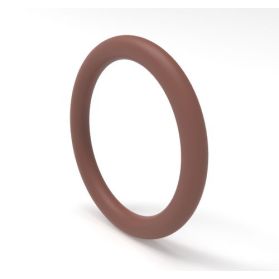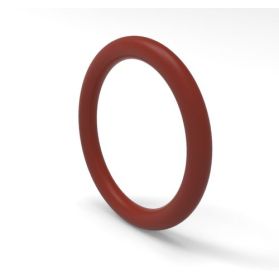O-ring VMQ
O-Rings in VMQ
Silicone elastomers (abbreviation VMQ) have no carbon polymer chain like conventional elastomers. The silicone polymer chain consists of alternating silicone and oxygen atoms (siloxanes). Silicone elastomers are processed as solid rubber and mostly cross-linked peroxide (alternative cross-linking with platinum) or as liquid rubber and mostly addition cross-linked.
Advantages of silicone
Silicone elastomers are characterised by a wide temperature range and very high low-temperature flexibility. The application temperature is in the range of -55 to 200°C, whereby higher or lower temperatures can be realised with special materials. Silicones have a good resistance to heat, ozone and ageing and are also resistant to animal and vegetable fats and oils and many chemicals. The mechanical properties such as tensile strength, elongation at break and abrasion resistance are slightly lower than those of other elastomers. Dynamic applications are not recommended due to the high coefficient of friction and the relatively low tensile strength.
Fields of application of silicone
Due to the purity of silicones, O-rings made of VMQ are neutral in taste and odour and are therefore often used in the food and beverage industry, as well as in medical technology, the pharmaceutical industry and in the field of household appliances.
HITEC® VMQ and NORMATEC® VMQ - Ideal materials for a wide range of applications
Angst+Pfister's VMQ standard material is the HITEC® VMQ 70.10-01 and is approved according to 3-A Sanitary Standard, USP Class VI, GB 4806.11-2016, FDA, EC 1935/2004 Article 3, EC 11/2003, EC 95/2002 (RoHS), EN 549 and is free of animal additives (ADI free).
Another very important VMQ material in the Angst+Pfister product range is NORMATEC® O-ring VMQ 70.00-02 red. This inexpensive compound is ideal for industrial applications that do not require approvals.


